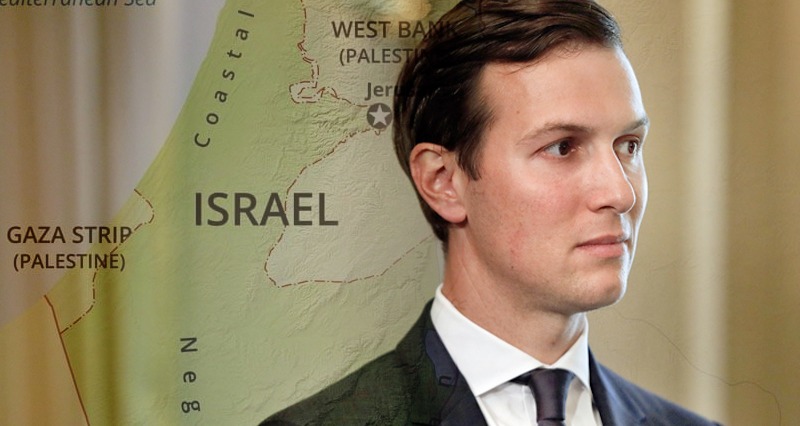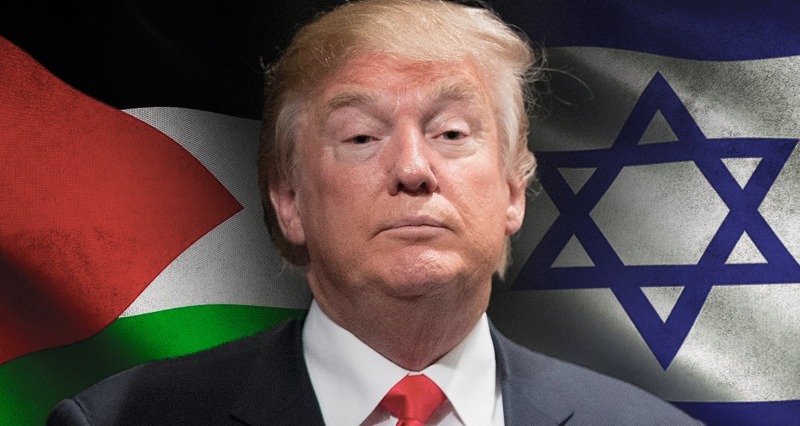Israeli media came up with a shocking story at the beginning of May. They had obtained details of Donald Trump’s notorious deal of the century that pertains to settling one of the most dragged-out conflicts in the Middle East. Israel Hayom newspaper that has close links to the office of Prime Minister Binyamin Netanyahu wrote it had received the details of a project known as ‘Deal of the Century’ and related to the final resolution of the Israeli-Palestinian conflict. The information had reportedly leaked the White House.
The background and true objectives of the deal
Debates on and speculations around the possible provisions of the deal are underway for two years as a minimum. The U.S. Administration launched the drafting of the plan right after Donald Trump moved to the White House.
It is believed that Trump’s son-in-law, Jared Kushner, who is simultaneously an advisor to the President and is known for his exceptionally pro-Israeli stance, is the initiator and designer of the plan.
Kushner said in April the plan for Middle East peace settlement would be made public in June upon completion of the Moslem holy month of Ramadan. He also said the main part of the document would focus on a program of economic development of the Palestinian territories, with billions of U.S. dollars would be funneled into it. Kushner claimed his plan would begin from the grassroots, meaning it would improve everyday living for the Palestinians first. He added along with it that both Palestinians and Israelis would have to accept difficult compromises. This was an apparent hint at the political aspect of the program. Still earlier Kushner revealed that the main part of Trump’s plan presupposed elimination of the borders in their current form, the free movement of people and commodities, and unification of all the Palestinian territories under a single authority.
Publication of all details of the plan has been delayed so far. And finally time has come.
The plan unveiled by Israel Hayom suggests that Israel, the Palestine Liberation Organization (PLO) and Hamas should sign a treaty on the institution of a Palestinian state, the so-called New Palestine that will incorporate the West Bank of the Jordan and the Gaza Strip, except for the lands occupied by Israeli settlements there. The block of Jewish settlements will be augmented with isolated settlements that will belong to Israel.
The documents also indicate that Jerusalem will not be split between the Israelis and the Arabs and will get the status of a joint capital of New Palestine and Israel at a time. The Arab residents of the city will get the passports of the Palestinian state. They will not have the right to buy houses from Jews while Jews will be unable to buy houses from the Arabs. Also, Palestine will rent the Egyptian lands adjoining the Gaza Strip. An airport, factories, farming zones, and trade areas will be created there. The sides are expected to determine the price and size of the areas with assistance from the parties supporting this arrangement – the U.S., the EU and Gulf monarchies. New Palestine will be entitled to getting as much as $ 30 billion for national projects from them over a period of five years.
The project also indicates that the Palestinian state will not have an army and only police officers there will carry small arms. Hamas will be expected to turn in their weaponry during the signing of the agreement. Members of the movement will be receiving salaries from the countries supporting the plan until a government of New Palestine is formed. Elections will be held in the country within twelve months.
The plan also says Israel will control the Jordan valley. If Hamas and the PLO turn the proposals down, the U.S. will block financial aid to the Palestinians. And if the PLO agrees to the terms of the deal and Hamas will reject them, the leaders of the movement will be held accountable. The White House also pledges support for Israel in the situations of a possible surge of conflicts between Israel and Hamas.

It is possible to interpret the plan as a manifestation of Trump’s fundamental efforts to take on the role of a peacemaker and to put an end to one of the longest smoldering conflicts in the Middle East. Yet the far more obvious conclusion is that it is essentially a fake and a deceptive ploy.
Trump’s special envoy to the Middle East talks, Janson Greenblatt, makes little secret of the essence of the document.
Deception lurks in the supposedly genuine wish of the U.S. to act as a peace-loving party in settling the very conflict without infringement of the interests of either side, not in the leakage of details of the plan. The U.S. defends the Israeli interests only, in fact.
The Palestinians rejected the U.S. mediatory services in settling the conflict after the U.S. officially announced recognition of Jerusalem as the capital of Israel in December 2017. Beyond any doubt, the move marked the first phase of practical steps on the ‘deal of the century’ in favor of Israel’s interests.
Jared Kushner feels confident the Arab countries will recognize the sovereignty of Israel within its current de facto borders including the occupied territories after all of this but the Palestinians will never accept the plan that is tantamount to destroying them.
The deal of the century is a politically lopsided U.S. initiative aimed at full colonization of the Palestinians as a sovereign nation in breach of all the international norms. In a nutshell, it pursues the goal of setting up an industrial ghetto in the Sinai desert where the Palestinians could be resettled, while Israel will build mighty military bases on the territories under its control and will use them further for a large-scale war with Iran and its ally, Hezbollah.
What will the Arab World tell Trump?
The League of Arab States headquartered in Cairo has turned down Trump’s peace plan, saying peace is inconceivable without prior guarantees for legitimate territorial rights for the Palestinians. Egypt and Jordan as the main Arab players, in most probability, will not support the Trump plan and will not allow the U.S. to redraw the map of the Middle East.
Egyptian President el-Sisi has enough problems of his own – he has to complete the efforts to introduce the constitutional amendments that will enable him to hold office through to 2030. His other tasks are to tame the recalcitrant Egyptians and to continue struggle with the Moslem Brotherhood. In addition, the military coups and unrest in Algeria and Sudan and the bloody conflict in Libya also put el-Sisi on alert. That is why the Egyptian leadership is certainly interested in preventing protests in their homeland around the deal of the century.
The likelihood of support for the deal on the part of Jordan is also small although the country depends on American aid in many ways. King Abdullah II realizes the dangers that unrest among his own subjects and the 1.9 million Palestinians living the country will be fraught with.
As for the position of Syria and Lebanon, and especially the Hezbollah military and political organization, on Tump’s deal of the century, it is obvious and consists in averting colonization of the Palestinians and recognition of Israel’s sovereignty over the annexed Golan Heights.
Saudi Arabia is, in fact, the only Arab country that shows solidarity with the deal in contravention of the consensus existing among the Arabs. It pursues its own objectives and is prepared to let the Americans refashion the map for the Middle East for the dollars the dollars that pour in from them, thus stepping over the centuries-old dogma of unity of the Arab world.
Press TV channel said at the beginning of May the Saudi Crown Prince, Mohammed bin Salman, offered assistance to Palestinian President Mahmoud Abbas in consolidating control in the West Bank of the Jordan and financial aid in the amount of $ 10 billion for boosting the economy in exchange for support to the deal of the century. Abbas said, however, political reality made it impossible for him to accept the U.S. plan.
Still, even though Saudi Arabia performs the functions of a U.S. satellite and de facto votes for Israel by accepting the deal of the century, it nonetheless does not look ready to plunge into an armed conflict with other Arab countries that speak out strongly against the Trump plan.
That is why it looks highly probable that Trump will fail in his striving to ram through the deal, which overtly benefits the Israelis and himself. His plan cannot rally support of all the Arab states or the majority of other important world powers.

















Leave a Reply